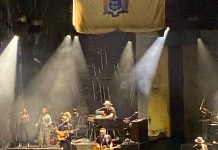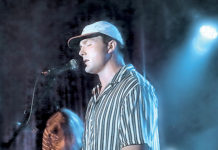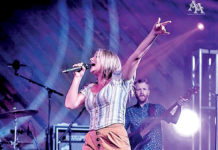By Linda McK. Stewart
Jura, a desolate stringbean of an island in the Hebrides, lies 16 miles off the west coast of Scotland. Thirty miles long and 7 miles wide, it is home to 210 residents and some 5,500 red deer.
Call it bleak, call it desolate, nonetheless Jura’s place in the annals of literature is forever assured. For it was to Jura that, in 1948, wracked with consumption, George Orwell, né Eric Blair, retired to write his masterpiece, “1984.”
1948 was not an auspicious year. Following the ordeal of World War II, Britain was flung, ill-fed and exhausted, onto the shores of victory. Orwell, likewise, was at his most despondent. He was 45, disillusioned, near death and the single parent of a 2-year old son.
“Animal Farm,” published in 1945, had yet to achieve worldwide fame. Homeless and in failing health, Orwell still had one more book under his belt. Coming to his aid, friends on Jura offered him the use of Barnhill, a farmhouse, minus heat, light and running water. It lay 24 miles up a rutty, often impassable road from Craigstown, Jura’s single source of provisions. Orwell and child moved in. Their only transport was an ancient motorbike.
Today life on Jura is almost as challenging as it was in Orwell’s time. Just getting there is a challenge. From Kennacraig on the mainland, aboard the red and white Caledonian MacBrayne ferries, it’s a 2-hour sail out to the lush green island of Islay (pronounced eye-la).
The flinty, brown, craggy island of Jura lies just on the other side of the Sound of Islay, a 3.5-mile channel, negotiated by a pint-size ferry which might or might not be operating.
From Jura’s miniscule ferry landing it’s a 7-mile trip on a doubtful road to Craigstown, Jura’s only center of commerce. It consists of one hotel, one distillery, one elementary school, one church, one petrol pump, one shop/post office and two docks.
Every autumn Jura comes briefly into its own with the deer stalking season. During those few weeks, Jura’s farmers and fishermen desert farm and furrow, boat, bait and nets and hire out as ghillies – or guides – for the tweedy sportsmen who arrive in search of the perfect wall-hung trophy, preferably with a broad rack of antlers.
Deer stalking is not for the faint of heart. It requires large drafts of fortitude, both inner and outer, plus patience, determination and unlimited stores of optimism. Drawing a bead on a gun-shy stag, the sportsman’s plus ultra dream, is by no means assured. Indeed, returning at day’s end, empty-handed and exhausted is an integral part of the sport’s cachet. Defeat, quite as much as victory, provides all the right stuff for the evening’s go-round in front of a peat fire, a fine single malt whiskey in hand.
Stalking aside, recreation on Jura is limited to hiking, bird-watching and sailing, which just might include a scary visit to Corryvreckan, Jura’s famous whirlpool, lying just off the island’s north coast, said to be the inspiration for Edgar Allan Poe’s “A Descent into the Maelstrom.”
Livestock is scanty since the island’s top soil is acidic and wholly deficient in those nutrients that make for picturesque flocks and happy herds. Still a few sheep in black socks and curly woolen overcoats, black and white Guernseys and an occasional cinnamon-colored Highland bovine wander Jura’s only road, grandly called the A-826. It’s a name that offers no hint of the tank traps that await the innocent driver along its rutted 20-some miles.
Jura is accustomed to the global spotlight on bookish occasions that pop up around the world, usually in celebration of “1984,” Orwell’s dystopian novel, which has sold some 8-million copies around the world. In between such occasions, Jura slumbers largely undisturbed by public brouhaha.
But now from a most unexpected quarter, an international argument has sprung up in which Orwell, and hence Jura, are the stuff of late night talk shows and front page disclaimers. Far be it from me to untangle the issues of that argument. Suffice it to say that two giant book distributors, Amazon and Hachette, have squared off against each other, each accusing the other of improper book pricing. Into the ruckus come quotes from Orwell who did – or did not – sanction lower costs for books of any kind. Both sides claim him as their rightful spokesman.
Echoes of this fuss have reached Jura but have failed to make much of a stir. Contrary to what you might think, Jura doesn’t think much of Orwell. Just for starters, he was an Englishman. Furthermore his brand of socialism bore not the faintest resemblance to the self-sufficient thinking of most Jurans.
Still, while the price war lasts, there will be that handful of Orwellian die-hards who will head to Jura for a literary brushup.
Barnstable, where he wrote “1984,” is a fine photo-op, though it can be viewed only from the road. The Jura Hotel, priming about now for the deer stalkers, can provide comfortable, well-plumbed lodging and tasty meals. Around-the-bar conversation is easy. But here a note of caution: The names of Eric Blair or George Orwell are not so well received. Best to stick to noncontroversial issues, such as climate change, world soccer or the price of good Scotch whiskey.
IF YOU GO: See www.visit scotland.org.














